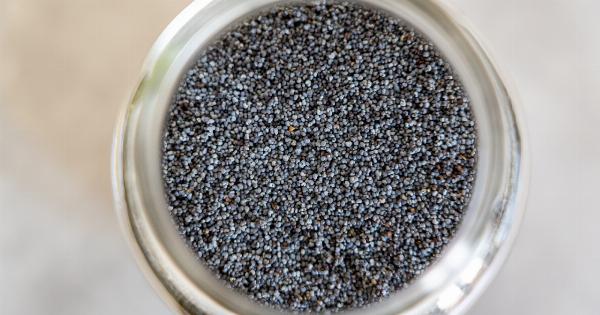Seeds are tiny packages of nutrition that have been consumed by humans for thousands of years. These small but mighty wonders are not only delicious additions to our meals, but they also offer numerous health benefits.
Packed with essential nutrients, fiber, and healthy fats, seeds are a powerhouse of nutrition that can help promote overall well-being. Whether you sprinkle them on top of salads, add them to smoothies, or incorporate them into baked goods, incorporating seeds into your diet can unleash their full potential and contribute to optimal health.
Flaxseeds: A Treasure Trove of Health Benefits
Flaxseeds are one of the most nutrient-dense seeds available, boasting an impressive nutritional profile.
They are an exceptional source of alpha-linolenic acid (ALA), a plant-based form of omega-3 fatty acids that supports heart health and reduces inflammation. Additionally, flaxseeds contain lignans, which have antioxidant properties and may have a positive impact on hormonal balance.
Due to their high fiber content, flaxseeds promote digestive health and help regulate bowel movements. Including flaxseeds in your diet can aid in preventing constipation and promoting regularity.
The soluble fiber content of flaxseeds also contributes to a feeling of fullness, which can be beneficial for weight management.
When consuming flaxseeds, it’s essential to grind them before eating. Grinding flaxseeds maximizes their nutritional benefits, as their tough outer shell is difficult to break down during digestion.
Ground flaxseeds are more easily absorbed by the body, allowing you to enjoy their full range of health-promoting properties.
Chia Seeds: Nature’s Superfood
Chia seeds have gained immense popularity in recent years, and for good reason. These tiny black seeds are loaded with nutrients and offer a plethora of health benefits.
Rich in fiber, omega-3 fatty acids, and antioxidants, chia seeds provide long-lasting energy and help regulate blood sugar levels.
One of the unique properties of chia seeds is their ability to absorb liquid and form a gel-like substance in the stomach. This gel formation slows down the digestion process, promoting sustained energy levels and helping you feel fuller for longer.
This quality of chia seeds makes them an excellent addition to weight management diets.
The high omega-3 fatty acid content of chia seeds makes them beneficial for heart health. These fatty acids have been shown to lower triglyceride levels, reduce inflammation, and improve overall cardiovascular function.
Adding a daily dose of chia seeds to your meals or snacks can be a simple yet effective way to support your heart health.
Pumpkin Seeds: A Nutritional Powerhouse
Pumpkin seeds, also known as pepitas, are a nutritional powerhouse that packs a punch of flavor. These seeds are an excellent source of magnesium, iron, zinc, and protein, making them a valuable addition to plant-based diets.
Magnesium plays a crucial role in various bodily functions, including maintaining healthy blood pressure levels, supporting bone health, and promoting proper nerve and muscle function.
Pumpkin seeds are one of the richest plant-based sources of magnesium, making them a fantastic snack for those looking to increase their intake of this vital mineral.
Iron is essential for the production of red blood cells and the transportation of oxygen throughout the body.
Incorporating iron-rich foods like pumpkin seeds into your diet can help prevent iron deficiency anemia, a condition characterized by fatigue, weakness, and impaired cognitive function.
Zinc, another mineral abundant in pumpkin seeds, is involved in immune function, wound healing, and DNA synthesis. Snacking on pumpkin seeds can provide a natural boost to your immune system and support overall health.
Sesame Seeds: Tiny Seeds with Big Benefits
Sesame seeds are small but mighty when it comes to their health-promoting effects. These tiny seeds are bursting with essential nutrients, including calcium, iron, magnesium, and B vitamins.
Calcium is crucial for maintaining strong bones and teeth, and sesame seeds are an excellent source of this mineral.
Including sesame seeds in your diet can contribute to optimal bone health, especially for individuals who avoid dairy products or have lactose intolerance.
Iron, as mentioned earlier, plays a vital role in oxygen transportation and the prevention of anemia. Sesame seeds offer a plant-based source of iron that can be especially beneficial for vegetarians and vegans.
Magnesium is involved in over 300 biochemical reactions in the body and plays a critical role in energy production, muscle function, and nerve transmission.
Snacking on sesame seeds or using sesame seed oil in cooking can ensure you’re getting enough of this essential mineral.
Furthermore, sesame seeds contain lignans and phytosterols, which have been linked to a reduced risk of heart disease and improved cholesterol levels.
Adding sesame seeds to your meals can contribute to a heart-healthy diet and enhance overall well-being.
Sunflower Seeds: A Tasty Source of Vitamin E
Sunflower seeds are not only a delicious snack; they are also rich in essential nutrients, particularly vitamin E. Vitamin E is a powerful antioxidant that helps protect the body’s cells from damage caused by free radicals.
Antioxidants play a crucial role in overall health by neutralizing harmful free radicals and reducing oxidative stress.
Including sunflower seeds in your diet can boost your antioxidant intake and contribute to the prevention of chronic diseases such as heart disease and certain types of cancer.
In addition to vitamin E, sunflower seeds are a good source of healthy fats, fiber, and various minerals.
They provide a satisfying crunch and can be enjoyed as a snack on their own or added to salads, stir-fries, or baked goods for an extra nutritional boost.
Hemp Seeds: A Complete Protein Source
Hemp seeds are one of the few plant-based sources of complete protein, making them an excellent addition to vegetarian and vegan diets. These seeds contain all nine essential amino acids that the body cannot produce on its own.
Protein is essential for the growth and repair of tissues, the production of enzymes and hormones, and the overall functioning of the body.
By incorporating hemp seeds into your meals, you can ensure that you’re getting a wide range of amino acids necessary for optimal health.
In addition to being a complete protein source, hemp seeds contain an ideal ratio of omega-6 to omega-3 fatty acids, which is important for maintaining a healthy inflammatory response in the body.
These fatty acids are also beneficial for brain health, skin health, and cardiovascular function.
Hemp seeds have a pleasantly nutty flavor and can be sprinkled on top of salads, blended into smoothies, or used in baking to add a nutritional boost to your favorite recipes.
Pomegranate Seeds: Antioxidant-Rich Delights
Although less commonly discussed, pomegranate seeds are worthy of attention when it comes to their health benefits. Packed with antioxidants, vitamins, and minerals, these ruby-red gems offer a range of nutritional advantages.
Antioxidants are compounds that help protect the body against free radicals and oxidative stress.
Pomegranate seeds are particularly rich in potent antioxidants known as punicalagins, which have been shown to have anti-inflammatory effects and may help reduce the risk of chronic diseases.
In addition to their antioxidant content, pomegranate seeds are an excellent source of vitamin C, vitamin K, and folate. Vitamin C supports immune function and collagen production, while vitamin K plays a crucial role in blood clotting and bone health.
Folate is essential for DNA synthesis and cell division, making it especially important during pregnancy.
Pomegranate seeds make a delightful addition to both sweet and savory dishes. Sprinkle them on top of yogurt, salads, or desserts, or enjoy them on their own as a tasty and nutritious snack.
Conclusion
Seeds are not to be underestimated when it comes to their nutritional value. These tiny powerhouses are packed with essential nutrients, fiber, and healthy fats that can support overall health and well-being.
Whether you choose to incorporate flaxseeds, chia seeds, pumpkin seeds, sesame seeds, sunflower seeds, hemp seeds, or pomegranate seeds into your diet, each variety offers a unique set of health benefits.
From promoting heart health, supporting digestive function, and enhancing bone density to providing essential nutrients and antioxidants, seeds are a versatile and delicious way to take control of your health and unleash the power within.




























